- Home
- E. F. Benson
Dodo's Daughter: A Sequel to Dodo Page 2
Dodo's Daughter: A Sequel to Dodo Read online
Page 2
CHAPTER II
It had been said, by Edith Arbuthnot, perhaps unkindly, but withsufficient humor to neutralize the acidity, that there was alwayssomebody awake day and night in Dodo's house tending the flame ofegoistic introspection. Edith did not generally use long words, butchose them carefully when she indulged in polysyllables. She had notbeen so careful in the choice of her confidant, for she had fired thiswithering criticism at her son Berts, who in the true spirit of anaffectionate nephew instantly repeated it to Dodo, who had roared withlaughter and sent Edith an enormous telegram (costing nine shillings anda halfpenny, including sixpence for a paid reply in case Edith wanted tocontinue the discussion) describing a terrible accident that had justhappened to herself.
"A most extraordinary and tragic affair" (this was all written out infull) "has just occurred at Meering at the house of Princess Waldenech.The unfortunate lady has just died of a sudden though not unexpectedattack of spontaneous egoism. Loud screams were heard from her room, andMr. Bertie Arbuthnot, son of the celebrated Edith Arbuthnot, the musicalcomposer, rushed in to find the princess enveloped in sheets of blueflame. The efforts made to quench her were of no avail and in a fewmoments all that was left of her was a small handful of ashes, whichcuriously enough, as they cooled, assumed the shape of a capital 'I.'Fear is felt that this outbreak may prove to be contagious, and allthose who have been in contact with the combusted princess are busydisinfecting themselves by talking about each other. It is believed thatMrs. Arbuthnot has begun to write a funeral march for her friend, forwhom she felt an adoring affection amounting almost to worship, in theunusual key of ten sharps and eleven flats. It is in brisk waltz timeand all the performers will blow their own trumpets. She is sendingcopies to nearly all the crowned heads of Europe."
Edith's reply was equally characteristic.
"Dodo, I love you."
The truth in Edith's criticism was certainly exemplified in the night ofwhich we are speaking, for Hugh did not leave Nadine's room, where shehad been engaged on the self-analysis given in the last chapter till twoo'clock, and at that precise moment Dodo, who had gone to bed more thanan hour before, woke up and began thinking about herself with uncommonintensity. And indeed there was sufficient to think about in thecircumstances with which she had at this moment allowed herself to besurrounded. For the last two days, the husband whom she had divorcedwith such extreme facility had been staying with her, and to-morrow,directly on his departure, Jack Chesterford, to whom she had beenengaged when she ran away with the husband she had just divorced, wasarriving. All her life Dodo had liked drama, as long as it occurredoutside the walls of English theaters, but better than the theaters evenof Paris were the dramas which came into real life, especially when youcould not possibly tell (even though you were acting yourself) what wasgoing to happen next. Best of all she liked acting herself, having apart to play, without the slightest idea what she or anybody else wasgoing to do or say.
Dodo's zest for life did not decrease with years, nor did her interestin it in the least diminish as the time of her youth began to recedeinto horizons far behind her. For all the time other horizons weregetting closer to her, and she could imagine herself being quiteold--"as old as Grannie" in fact--without any of the tragic envy of pastyears that so often make wormwood of the present. She had indeed settledthe mode of her procedure for those years, which were still far enoughoff, with some exactitude, and was quite determined to have a mob-capwith a blue riband in it, and gold-rimmed spectacles. Also she wouldread Thomas a Kempis a great deal,--she had read a little already, andwas now deliberately keeping the rest until she was seventy--and walkabout her garden with a tall cane and pick lavender. She had, moreover,promised herself to make no attempts at sprightliness or to have herhair dyed, since one of the few classes of women whom she reallyobjected to were those whom she called grizzly kittens, who dabbed atyou with their rheumatic old paws, and pretended that they had no needof spectacles, though it was quite clear they could not read the verylargest print. But she fully intended to remain exceedingly happy whenthose years came, for happiness so it seemed to her was a gift that camefrom within and could not be taken from you by any amount of externalcalamities or accumulation of decades. Certainly in the years that hadpassed she had had her share of annoyances, and in support of her theorywith regard to happiness it must be confessed that they had not deprivedher of one atom of it. Her late husband's conduct, for instance, had foryears been of the most disagreeable kind, and she had borne with it notin the least like a tearful lamb but more like a cheerful lion. It hadnot in the least discouraged her with life in general, but onlydisgusted her with him. For the last two years before she got herdivorce, he had been, as she expressed it, "too Bacchic for anything,"and she had sent Nadine away from their homes in Austria to live with avariety of old friends in England. Eventually Dodo had decided that shewould waste no more time with her husband and got her freedom coupledwith an extremely handsome allowance. She continued to call herself"Princess Waldenech," because it was still rather pleasant being aPrincess, and Waldenech told her that, as far as he was concerned, shemight call herself "Dowager-Empress Waldenech," or anything else shechose.
So for a year now she had been in England, and had stepped back, orrather jumped back, into the old relations with almost all that numerousbody of people who twenty years ago had helped to make life soenchanting. And with the same swiftness and sureness she had establishedherself in the hearts of the younger generation that had grown up since,so that the sons and daughters of her old friends became her nephews andnieces. Nadine, with the beauty, the high spirits and power of enjoymentthat was hers by birthright, had so it seemed to her mother succeeded toa place that was very like what her own had been rather more than twentyyears ago. Of course there was a tremendous difference in their modes,for the manners and outlook of one generation are as divergent fromthose of the last, as are the clothes they wear, but the same passionatelove of life, the same curiosity and vividness inspired her daughter'sfriends, even as they had inspired her own. And since she herself hadlost not one atom of her own vitality, it was not strange that the yearsbetween them and her were easily bridged over.
* * * * *
There were one or two voices that were silent in the chorus of welcomewith which Dodo's reappearance had been hailed. One of these was EdithArbuthnot, who, though she did not desire to put any restrictions onBerts' intimacy (which was lucky, since Berts was a young gentlemanhideously gifted with the power of getting his way) loudly proclaimedthat she could never be friends with Dodo again. But the answer she hadsent to Dodo's remarkable telegram about combusted egoism a few daysbefore seemed to indicate that she had surrendered and, though she hadsubsequently announced that Dodo was heartless, might be regarded as aconvert, especially since Jack had at last yielded too, and had invitedhimself down here. Another fortress hitherto impregnable was Mrs.Vivian, for whom Dodo in days gone by had felt as solid an affection asshe was capable of. Consequently she regretted that Mrs. Vivian wasinvariably unable to come and dine, and never manifested the slightestdesire that Dodo should come to see her. Her regret was slightlytempered by the fact that Mrs. Vivian had an ear-trumpet in these days,which she presented to people whose conversation she desired to hearrather in the manner that elephants at the Zoo hold out their trunks forrefreshments. Somehow that seemed to make her matter less, and Dodo hadnot at present made any determined effort to beleaguer her. But sheintended when she went back to town in July to capture what was nowpractically the only remaining stronghold of the disaffected.
When Dodo drowsily awoke that night just at the time that Hugh andNadine had finished their talk it was the thought of Jack that firststirred in her mind. Instantly she was perfectly wide-awake. During thislast year, though he was great friends with Nadine, he had absolutelyavoided coming into contact with herself. He never went to a house whereDodo was expected, and once finding she was staying for aSaturday-till-Monday with the Granthams, had lef
t within ten minutes ofhis arrival. Miss Grantham had conceived this misbegotten plan ofbringing them unexpectedly face to face, with the only result that theparty numbered thirteen, and her father was very uncomfortable forweeks afterwards. Once again they had been caught in a block intaxi-cabs exactly opposite each other. Dodo, taking the bull by thehorns, had leaned impulsively toward him with both hands outstretchedand cried, "Ah, Jack, are we never to meet again?" On which the bull, soto speak, paid his fare, and continued his journey on foot. Dodo hadbeen considerably disappointed by this rebuff: it had seemed to her thatno man should have resisted her direct appeal. On the other hand, Jackon seeing her had nailed to his face so curiously icy a mask that hisappearance became quite ludicrous. Also he knocked his hat against theroof of the closed half of his cab, and it fell into the road, in themiddle of an unusually deep puddle. She noticed that he was not baldyet, which was a great relief, since she detested the sight of craniums.
And now Jack had yielded, had walked out of his citadel without anyfurther assault being delivered, and was to arrive to-day. At thethought, when she woke in the stillness of earliest morning, Dodo'sbrain started into fullest activity, and, as always, as much interestedin the motives that inspired actions as in the actions themselves, sheset herself to ponder the nature of the impulse which had caused socomplete a _volte-face_. But the action itself interested and charmedher also: all this year she had wanted to see Jack again. He hadunderstood her better than any one, and in spite of the vile way inwhich she had used him, she had more nearly loved him than either of themen she had married. Her first husband had never been more to her than"an old darling," and often something not nearly that. Of Waldenech shehad simply been afraid: under the fascination of fear she had done whathe told her. But Jack--
Dodo felt for the switch of her electric light: the darkness was tooclose to her eyes, and she wanted to focus them on something. Clearlythere were several possibilities any of which would account for thischange in him. He might perhaps merely wish to resume ordinary andfriendly relations with her. But that did not seem a likely explanation,since, if that was all, he would more naturally have waited till shereturned to town again after this sojourn in the country. There musthave been in his mind a cause more potent than that. Naturally the morepotent cause occurred to her, and she sat up in bed. "It is tooludicrous," she said to herself, "it cannot possibly be that." And yethe had remained unmarried all these years, with how many charming girlsabout who would have been perfectly willing to share his wealth andtitle, not to speak of himself.
* * * * *
Dodo got out of bed altogether; and went across the room to where a biglooking-glass set in the door of her wardrobe reflected her entirefigure. She wished to be quite honest in her inspection of herself, tosee there not what she wanted to see but what there was to be seen. Theroom was brightly lit, and through her thin silk nightdress she couldsee the lines of her figure, molded in the soft swelling curves of hermatured womanhood. Yet something of the slimness and firm elasticity ofyouth still dwelt there, even as youth still shone in the smoothunwrinkled oval of her face and sparkled in the depths of her dark eyes.Right down to her waist hung the thick coils of her black hair, stilluntroubled by gray, and slim and shapely were her ankles, soft and rosyfrom the warmth of her bed her exquisite feet. And at the sight ofherself her mouth uncurled itself into a smile: the honesty of herscrutiny had produced no discouraging revelations. Then frankly laughingat herself she turned away again, and wholly unconsciously andinstinctively took half a dozen dance-steps across the Persian rugs thatwere laid down over the polished floor. She could no more help thatimpulse of her bubbling vitality than she could help the fact that shewas five feet eight in height.
The coolness and refreshment of the two hours before dawn streamed inthrough her open window, and she put on the dressing-gown with itscascades of lace and blue ribands that lay on the chair by herdressing-table. Supposing it was the case that Jack was coming for her,that he wanted her now as in the old days when she had thrown hisdevotion back at him like a pail of dirty water, what answer would shemake him? Really she hardly knew. Neither of her marriages had been aconspicuous success, but for neither of her husbands had she feltanything of that quality of emotion which she had felt for the man shehad treated so infamously. She gave a great sigh and began ticking offcertain events on her fingers.
"First of all I refused him before I married poor darling Chesterfordthe first," she said to herself. "Secondly, having married Chesterfordthe first, I asked Jack to run away with me. But that was in a moment ofgreat exasperation: it might have happened to anybody. Thirdly, as soonas Chesterford I. was taken, I got engaged to Jack which I ought to havedone originally; and fourthly, I jilted him and married Waldenech."
Dodo had arrived at her little finger and held her other hand poisedover it.
"What the devil is fifthly to be?" she said aloud.
She got out of her chair again.
"It is very odd but I simply can't make up my mind," she thought, "and Iusually can make it up without the slightest trouble; indeed it isusually already made up, just as one used to find eggs already boiled inthat absurd machine that always stood by Chesterford at breakfast. Ihate boiled eggs! But I wonder if I owe it to Jack to marry him if hewants me to? Supposing he says I have spoiled his life, and he wants meto unspoil it now? Is it my duty apart from whatever my inclination maybe, and I wish I knew what it was?"
Dodo felt herself quite unable to make up her mind on this somewhatimportant point. She felt herself already embarked on an argument withJack, as she had been so often embarked in the old days, and on howpleasant and summery a sea. She would certainly tell him that nobodyought to let his life be spoiled by anybody else, and she would point toherself as a triumphant instance of how she had refused to let her joyof life get ever so slightly tarnished by the really trying experiencesin her partnership with Waldenech. Here was she positively as good asnew. And then unfortunately it occurred to her that Jack might say "Butthen you didn't love him." And the ingenious Dodo felt herself unable toframe any reply to this very bald suggestion. It really seemedunanswerable.
There was a further reason which might account for Jack's coming:Nadine. Dodo knew that the two were great friends. She had even heard itsuggested that Jack had serious thoughts with regard to her. Very likelythat was only invented by some friend who was curious to know how sheherself would take the suggestion, but clearly this was not animprobable, far less an impossible, contingency. But that Nadine hadserious thoughts with regard to Jack was less likely. Dodo felt that herdaughter took after herself in emotional matters and was probably not atthat age seriously thinking about anybody. Yet after all she herself hadmarried at that age (though without serious thought) and the experimentwhich seemed so sensible and promising had been a distinctdisappointment. Ought she to warn Nadine against marrying without love?Or would that look as if, for other reasons, she did not wish her tomarry Jack? That would be an odious interpretation to put on it, and theworst of it was that she was not perfectly certain whether there was notsome sort of foundation for it. Something within her ever so faintlyresented the idea of Jack's marrying Nadine.
Dodo's thought paused and was poised over this for a little, and shemade an eager and a conscious effort to root out from her mind thisfeeling of which she was genuinely ashamed. Then suddenly all hermeditations were banished, for from outside there came the first faintchirrupings of an awakening bird. Deep down in her, below thetrivialities and surface-complications of life, below all herwarm-heartedness and her egoism there lay a strain of natural untaintedsimplicity, and these first flutings of birds in the bushes roused it.She went to the window and drew up the blind.
The dusk still hovered over the sea and low-lying land, and in the skyalready turning dove-colored a late star lingered, remotely burning. Thebird that had called her to look at the dawn had ceased again, and apause holy and sweet and magical brooded over this virginal meeting ofnight
and day. But far off to the right the hill-tops had got theearliest news of what was coming and were flecked with pale orientreflections and hints of gold and scarlet and faint crimson. But herebelow the dusk lay thick still, like clear dark water.
Just below her window lay the lawn, garlanded round with sleeping anddew-drenched flower-beds and the incense of their fragrant buds andfolded petals still slept in the censer, till in the East should risethe gold-haired priest and swing it, tossing high to heaven thefragrance of its burning. And then from out of the bushes beyond therescudded a thrush, perhaps the same as had called Dodo to the window. Hescurried over the shimmering lawn with innumerable footfalls, and cameso close underneath her window that she could see his eyes shining. Thenhe swelled his throat, and sang one soft phrase of morning, paused as iflistening and then repeated it. All the magic of youth and joy of lifewas there: there was also in Dodo's heart the indefinable yearning fordays that were dead, the sense of the fathomless well of time into whichforever dropped beauty and youth and the soft sweet days. But thatlasted but a moment, for as long as the thrush paused. Another voice andyet another sounded from the bushes; there were other thrushes there,and in the ivy of the house arose the cheerful jangling of sparrows.Fresh-feathered forms ran out upon the lawn, and the air was shrill withtheir pipings. Every moment the sky grew brighter with the imminent day,the last star faded in the glow of pink translucent alabaster, and inthe green-crowned elms the breeze of morning awoke, and stirred thetree-tops. Then it came lower, and began to move in the flower-beds, andthe wine of the dew was spilled from the chalices of new-blown roses,and the tall lilies quivered. There was wafted up to her theindescribable odor of moist earth and opening flowers, and on the momentthe first yellow ray of sunlight shot over the garden.
Dodo stood there dim-eyed, unspeakably and mysteriously moved. Shethought of other dawns she had seen, when coming back perhaps from aball where she had been the central and most brilliant figure all nightlong; she thought of other troubled dawns when she had wakened from someunquiet dream and yet dreaded the day. But here was a perfect dawn andit seemed to symbolize to her the beginning of the life that lay infront of her. She looked forward to it with eager anticipation, she gaveit a rapturous welcome. She was in love with life still, she longed tosee what delicious things it held in store for her. She felt sure thatGod was going to be tremendously kind to her. And in turn (for she had acertain sense of fairness) she felt most whole-heartedly grateful anddetermined to deserve these favors. There were things in her life shewas very sorry for: such omissions and commissions should not occuragain. She felt that the sight of this delicious dawn had been a sort ofrevelation to her. And with a great sigh of content, she went back tobed, and without delay fell fast asleep and did not awake till her maidcame in at eight o'clock with a little tray of tea that smelt too goodfor anything, and a whole sheaf of attractive-looking letters, large,stiff square ones, which certainly contained cards that bade her todelightful entertainments.
She always breakfasted in her room, and when she came downstairs abouthalf-past ten, and looked into the dining-room, she found to hersurprise that Waldenech was there eating sausages one after the other.This was a very strange proceeding for him, since in general he adoptedslightly shark-like hours and did not breakfast till at leastlunch-time. Time, or at any rate, his habits and method of spending it,had not been so kind to him as to Dodo and though it had not robbed himof that look of distinction which was always his it had conferred uponhim the look of being considerably the worse for wear. He seemed asmuch older than his years as Dodo appeared younger than hers, and shewas no longer in the least afraid of him. Indeed it struck her thatmorning as she came in, with a sense of wonder, that she had ever foundhim formidable.
"Good-morning, my dear," she said, "but how very surprising. Haseverybody else finished and gone out? Waldenech, I am so glad yousuggested coming here, and I hope you haven't regretted it."
"I have not enjoyed any days so much since you left me," he said.
"How dear of you to say that! Every one thought it so extraordinary thatyou should want to come here or that I should let you, but I amdelighted you did."
He left his place, and came to sit in a chair next her. The remains ofNadine's breakfast were on a plate opposite: half a poached egg, somemelon rind, marmalade and a cigarette end. He pushed these ratherdiscouraging relics away.
"It is not extraordinary that I should want to come here," he said, "forthe simple reason that you are the one woman I ever really cared about.I always cared for you--"
"There are others who think you occasionally cared for them," remarkedDodo.
"That may be so. Now I should like to stop on. May I do so?"
"No, my dear, I am afraid that you certainly may not," she said. "Jackcomes to-day and the situation would not be quite comfortable, not tosay decent."
"Do you think that matters?" he asked.
"It certainly is going to matter. You haven't really got a Europeanmind, Waldenech. Your mind is probably Thibetan. Is it Thibet where youdo exactly as you feel inclined? The place where there are Llamas."
"I do as I feel inclined wherever I am," said he.
Dodo remembered, again with wonder, the awful mastery that that sort ofsentence as delivered by him used to have for her. Now it had none ofany kind: his personality had simply ceased to be dominant with regardto her.
"But then you won't be here," said she. "You will go by that veryexcellent train that never stops at all; I have reserved a carriage foryou."
He lit a cigarette.
"I must have been insane to behave to you as I did," he said. "It wasmost intensely foolish from a purely selfish point of view."
She patted his hand which lay on the table-cloth.
"Certainly it was," she said, "if you wanted to keep me. I told you somore than once. I told you that there were limits, but you appeared tobelieve there were not. That was quite like you, my dear. You alwaysthought yourself a Czar. I do not think we need to go into pasthistories."
He got up.
"Dodo, would you ever under any circumstances come back to me?" he said."There is Nadine, you know. It gives her a better chance--"
Dodo interrupted him.
"You are not sincere when you say that. It isn't of Nadine that youthink. As for your question, I have never heard of any circumstanceswhich would induce me to do as you suggest. Of course we cannot say thatthey don't exist, but I have never come across them. Don't let us thinkof it, Waldenech: it is quite impossible. If you were dying, I wouldcome, but under the distinct understanding that I should go away again,in case you got better, as I am sure I hope you would. I don't bear youthe slightest ill-will. You didn't spoil my life at all, though it istrue you often made me both angry and miserable. As regards Nadine, shehas an excellent chance, as you call it, under the present arrangements.All my friends have come back to me, except Mrs. Vivian."
"Mrs. Vivian?" said he. "Oh, yes, an English type, earnest widow."
"With an ear-trumpet now," continued Dodo; "and I shall get her someday. And Jack comes this afternoon. _Voila_, the round table again! Itake up the old life anew, with the younger generation as well, not apenny the worse."
"You are a good many pennies the better," said he in self-justification."As regards Lord Chesterford: why is he coming here?"
"I suppose because, like you, he wants to see me and Nadine or both ofus."
"Do you suppose he wants to marry you?" he asked. "Will you marry him?"
Dodo got up, reveling in her sense of liberty.
"Waldenech, you don't seem to realize that certain questions from youto me are impertinent," she said. "My dear, what I do now is none ofyour business. You have as much right to ask Mrs. Vivian whether she isthinking of marrying again. You have been so discreet and pleasant allthese days: don't break down now. I have not the slightest idea if Jackwants to marry me now, as a matter of fact; and I have really no idea ifI would marry him in case he did. It is more than twenty years si
nce Ispoke to him--oh, I spoke to him out of a taxi-cab the other day, but hedid not answer--and I have no idea what he is like. In twenty years onemay become an entirely different person. However, that is all mybusiness, and no one else's. Now, if you have finished, let us take astroll in the garden before your carriage comes round."
"I ask then a favor of you," he said.
"And what is that?"
"That you be yourself just for this stroll: that you be as you used tobe when we met that summer at Zermatt."
Dodo was rather touched: she was also relieved that the favor was one soeasy to grant. She took his arm as they left the dining-room and cameout into the brilliant sunshine.
"That is dear of you to remember Zermatt," she said. "Oh, Waldenech,think of those great mountains still standing there in their silly rowswith their noses in the air. How frightfully fatiguing! And they allused to look as if they were cuts with each other, and there they'll bea thousand years hence, not having changed in the least. But I'm notsure we don't have the better time scampering about for a few years,and running in and out like mice, though we get uglier and older everyday. Look, there is poor John Sturgis coming towards us: let us quicklygo in the opposite direction. Ah, he has seen us!--Dear John, Nadine waslooking for you, I believe. I think she expected you to read somethingto her after breakfast about Goths or Gothic architecture. Or was itBishop Algie you were talking to last night about cathedrals? One or theother, I am sure. He said he so much enjoyed his talk with you."
Waldenech felt that Dodo was behaving exactly as she used to behave atZermatt. Somehow in his sluggish and alcoholic soul there rosevibrations like those he had felt then.
"Talk to him or me, it does not matter," he said in German to her, "buttalk like that. That is what I want."
Dodo gave him one glance of extraordinary meaning. This little mutteredspeech strangely reminded her of the paean in the thrush's song at dawn.It recalled a poignancy of emotion that belonged to days long past, butthe same poignancy of feeling was hers still. She could easily feel andhabitually felt, in spite of her forty and more years, the mereout-bubbling of life that expressed itself in out-bubbling speech. Shealso rather welcomed the presence of a third party: it was easier forher to bubble to anybody rather than to Waldenech. She buttonholed theperfectly willing John.
"Bishop Algie is such a dear, isn't he?" she said. "He is accustomednot to talk at all, and so talking is a treat to him, and he loved you.He is taking a cinematograph show, all about the Acts of the Apostles,round the country next autumn to collect funds for Maud's orphanage. Theorphanage is already built, but there are no orphans. I think the moneyhe collects is to get orphans to go there, scholarships I suppose. Hemade all his friends group themselves for scenes in the acts, and he isusually St. Paul. There is a delicious shipwreck where they are tying upthe boat with rug-straps and ropes. He had it taken in the bay here, andit was extremely rough, which made it all the more realistic becausedear Algie is a very bad sailor and while he was being exceedinglyunwell over the side, his halo fell off and sank."
"We did not talk about the Acts of the Apostles last night," said Johnfirmly, "we talked about Gothic architecture, and Piccadilly, andWagner."
"But how entrancing," said Dodo. "I particularly love Siegfried becauseit is like a pantomime. Do you remember when the dragon comes out of hiscave looking exactly like Paddington station, with a red light on oneside and a green one on the other, and a quantity of steam, andwhistlings, and some rails? Then afterwards a curious frosty femaleappears suddenly in the hole of a tree and tells Wotan that his spearought to be looked to before he fights. Waldenech, we went together toBaireuth, and you snored, but luckily on the right note, and everybodythought it was Fafner. John, I was sitting in my window at dawn thismorning, and all the birds in the world began to sing. It made me feelso common. Nobody ought to see the dawn except the birds, and I supposethe worms for the sake of the birds."
Waldenech turned to her, and again spoke in German. "You are stillyourself," he said. "After all these years you are still yourself."
Dodo's German was far more expressive than his, it was also ludicrouslyungrammatical, and intensely rapid.
"There are no years," she said. "Years are only an expression used bypeople who think about what is young and what is old. Every one has hisessential age, and remains that age always. This man is about sixty, theage of his mother."
John Sturgis smiled in a kind and superior manner.
"Perhaps I had better tell you that I know German perfectly," he said."Also French and Italian, in case you want to say things that I shan'tunderstand."
Dodo stared for a moment, then pealed with laughter.
"Darling John," she said, "I think that is too nice of you. If you werenasty you would have let me go on talking. Isn't my German execrable?How clever of you to understand it! But you are old, aren't you? Ofcourse it is not your fault, nor is it your misfortune, since all agesare equally agreeable. We grow up into our ages if we are born old, andwe grow out of them, like missing a train, if our essential age isyoung. When you are eighty, you will still be sixty, which will bedelightful for you. I make plans for what I shall be when I am old, butI wonder if I shall be able to carry them out. When I am old, I shallbe what I shall be, I suppose. The inevitable doesn't take much noticeof our plans, it sits there like the princess on the top of theglass-hill while we all try, without the slightest success, to get atit. Ah, my dear Waldenech, there is the motor come round for you. Youwill have to start, because I have at last trained my chauffeur to giveone no time to wait at the station, and you must not jilt thecompartment I have engaged you to. It will get to London all alone: sobad for a young compartment."
He made no further attempt to induce her to let him stop, and Dodo, witha certain relief of mind, saw him drive off and blew a large quantity ofkisses after him.
"He was such a dear about the year you were born, John," she said, "butyou are too old to remember that. Now I must be Martha, and see the cookand all the people who make life possible. Then I shall become Maryagain and have a delicious bathe before lunch. Certainly the good partis much the pleasantest, as is the case always at private theatricals. Ithink we must act this evening: we have not had charades or anything fornearly two days."
* * * * *
John, like most prigs, was of a gregarious disposition, and liked thathis own superiority of intellect, of which he was so perfectlyconscious, should be made manifest to others and, literally, he couldnot imagine that Dodo should not seem to prefer burying herself inhousehold affairs when he was clearly at leisure to converse with her.He did not feel himself quite in tune with the younger members of theparty, and sometimes wondered why he had come here. That wonder wasshared by others. His tediousness in ordinary intercourse was thetediousness of his genus, for he always wanted to improve the minds ofhis circle. Unfortunately he mistook quantity of information for qualityof mind, and thought that large numbers of facts, even such low facts asdates, held in themselves the germ of culture. But since, at the presentmoment, Dodo showed not the smallest desire to profit by his leisure, hewandered off to the tennis-courts, where he had reason to believe heshould find companions. His faith was justified, for there was a rathertypical party assembled. Berts and Hugh were playing a single, whileEsther was fielding tennis-balls for them. They were both admirableperformers, equally matched and immeasurably active. At the momentEsther standing, as before Ahasuerus, with balls ready to give to Berts,had got in his way, and he had claimed a let.
"Thanks awfully, Esther," he said, as he took a couple of balls fromher, "but would you get a little further back? You are continuallygetting rather in my way."
"Oh, Berts, I'm so sorry," she said. "You are playing so well!"
"I know. Esther was in the light, Hugh."
"Oh rather, lot, of course," said Hugh.
Nadine took no active share. She was lying on the grass at the side ofthe court with Tommy, and was reading "Pride and Prej
udice" aloud. WhenEsther had a few moments to spare she came to listen. John joined thereading party, and wore an appreciative smile.
Nadine came to the end of a chapter.
"Yes, Art, oh, great Art," she said, shutting the book, "but I am notenchained. It corresponds to Madame Bovary, or the Dutch pictures. It isbeautifully done; none but an artist could have done it. But I find agreat deal of it dull."
John's smile became indulgent.
"Ah, yes," he said, "but what you call dull, I expect I should callsubtle. Surely, Nadine, you see how marvelous."
Esther groaned.
"John, you make me feel sick," she began.
"Balls, please," said Hugh.
Esther sprang up.
"Yes, Hugh, I'll get them," she said. "Aren't those two marvelous?" sheadded to Nadine.
"John is more marvelous," said Nadine. "John, I wish you would get drunkor cheat at cards. It would do you a world of good to lose a little ofyour self-respect. You respect yourself far too much. Nobody is sorespectable as you think yourself. We were talking of you last night: Iwish you had been there to hear; but you had gone to bed with yourcamomile tea. Perhaps you think camomile tea subtle also, whereas Ishould only find it dull."
"I think you are quibbling with words," he said. "But I, too, wish I hadheard you talking last night. I always welcome criticism so long as itis sincere."
"It was quite sincere," said Nadine, "you may rest assured. It wasunanimous, too; we were all agreed."
John found this not in the least disconcerting.
"I am not so sure that it matters then," he said. "When several peopleare talking about one thing--you tell me you were talking about me--theyought to differ. If they all agree, it shows they only see one side ofwhat they are discussing."
Nadine sat up, while Tommy buried his dissipated face in his hands.
"We only saw one side of you," she said, "and that was the obvious one.You will say that it was because we were dull. But since you likecriticism you shall know. We all thought you were a prig. Esther saidyou would be distressed if we thought differently. She said you likebeing a prig. Do tell me: is it pleasant? Or I expect what I call prig,you call cultured. Are you cultured?"
Tommy sat up.
"Come and listen, Esther," he shouted. "Those glorious athletes can pickup the balls themselves for a minute."
Esther emerged from a laurel bush triumphant with a strayed reveler.
"Oh, is Nadine telling John what she thinks?" she asked.
"Nadine is!" said Tommy.
Nadine meantime collected her thoughts. When she talked she ascertainedfor herself beforehand what she was going to say. In that respect shewas unlike her mother, who ascertained what she thought when she foundherself saying it. But the result in both cases had the spontaneousring.
"John, somehow or other you are a dear," she said, "though we find youdetestable. You think, anyhow. That gives you the badge. Anybody whothinks--"
Hugh, like Mr. Longfellow with his arrow, flung his racquet into theair, without looking where it went. He had a moment previously sent afast drive into the corner of the court, which raised whitewash in acloud, and won him the set.
"Nadine, are you administering the oath of the clan?" he said. "Youhaven't consulted either Berts or me."
Nadine looked pained.
"Did you really think I was admitting poor John without consulting you?"she said. "Though he complies with the regulations."
Hugh, streaming with the response that a healthy skin gives to heat,threw himself down on the grass.
"I vote against John!" he said. "I would sooner vote for Seymour. And Iwon't vote for him. Also, it is surely time to go and bathe."
"I don't know what you are all talking about," said John. "I daresay itdoesn't matter. But what is the clan?"
Hugh sat up.
"The clan is nearly prigs," he said, "but not quite. But you are, quite.We are saved because we do laugh at ourselves--"
"And you are not saved because you don't," added Nadine.
"And is the whole object of the clan to think?" asked John.
"No, that is the subject. Also you speak as if we all had said, 'Letthere be a clan, and it was so,'" said Nadine. "You mustn't think that.There was a clan, and we discovered it, like Newton and the orange."
"Apple, surely," said John.
Nadine looked brilliantly round.
"I knew he would say that," she said. "You see you correct what I say,whereas a clansman would be content to understand what I mean."
"Bishop Algie is clan, by the way," said Hugh. "I went down to bathebefore breakfast, and found him kneeling down on the beach saying hisprayers. That is tremendously clannish."
"I don't see why," said John.
Esther sighed.
"No, of course you wouldn't see," she said.
"Try him with another," said Nadine.
Esther considered.
"Attend, John," she said. "When the last Stevenson letters came out,Berts bought them and looked at one page. Then he took a taxi toPaddington and took a return ticket to Bristol."
"Swindon," said Berts.
"The station is immaterial, so long as it was far away. I daresaySwindon is quite as far as Bristol."
John smiled.
"There you are quite wrong," he said. "Swindon comes before Bath, andBristol after Bath. No doubt it does not matter, though it is as well tobe accurate."
Esther looked at him with painful anxiety.
"But don't you see why Berts went to Swindon or Bristol?" she said."Poor dear, you do see now. That is hopeless. You ought to have felt. Toreason out what should have been a flash, is worse than not to haveunderstood at all."
John, again like all other prigs, was patient with those not so giftedas himself.
"I daresay you will explain to me what it all amounts to," he said. "AllI am certain of is that Berts wanted to read Stevenson's letters and sogot into a train, where he would be undisturbed. Wouldn't it haveanswered the same purpose if he had taken a room at the Paddingtonhotel?"
Nadine turned to Berts.
"Oh, Berts, that would have been rather lovely," she said.
"Not at all," said he. "I wanted the sense of travel."
John got up.
"Then I should have recommended the Underground," he said. "You couldhave gone round and round until you had finished. It would have beenmuch cheaper."
Nadine waved impotent arms of despair.
"Now you have spoiled it," she said. "There was a possibility in thePaddington hotel, which sounds so remote. But the Underground! You mightas well say, why do I bathe, I who cannot swim? I can get clean in abath, though I only get dirty in the sea, and if I want the salt I canput Tiddle-de-wink salt or whatever the name is in my bath--"
"Tidman," said John.
"I am sure you are right, though who cares? I am knocked down by coldwaves, I am cut by stones on my soles. I am pinched by crabs and_homards_, at least I think I am; the wind gnaws at my bones, and myhair is as salt as almonds. Between my toes is sand, and bits of seaweedmake me a plaster, and my stockings fall into rock-pools, but do I gowith rapture to have a bath in the bathroom? I hate washing. There isnothing so sordid as to wash my face, except to brush my teeth. But tobathe in the sea makes me think: it gives me romance. Poor John, younever get romance. You amass information, and make a Blue Book. But weall, we make blue mountains, which we never reach. If we reached themthey would probably turn out to be green. As it is, they are alwaysblue, because they are beyond. It is suggestion that we seek, notattainment. To attain is dull, to aspire is the sugar and salt of life.Don't you see? To realize an ideal is to lose the ideal. It is like aman growing rich: he never sees his sovereigns: when he has gained themhe flings them forth again into something further. If he left them in abox, the real sovereigns, under his bed, what chance would there be forhim to grow rich? But out they go, he never uses them, except that hemakes them breed. It is the same with the riches of the mind. An idea,an ideal
is yours. Do you keep it? Personally you do. But we, no. Weinvest it again. It is to our credit, at this bank of the mind. We donot hoard it, and spend it piecemeal. We put it into something else.What I have perceived in music, I put into plays: what I have perceivedin plays I put into pictures. I never let it remain at home. But when Ishall be a millionaire of the mind, what, what then? Yes, that makes mepause. Perhaps it will all be converted, as they convert bonds, is itnot, and I shall put it all into love. Who knows, La-la."
Nadine paused a moment, but nobody spoke. Hugh was watching her with theabsorption that was always his when she was there. But after a momentshe spoke again.
"We talk what you call rot," she said. "But it is not rot. The peoplewho always talk sense arrive at less. There are sparks that fly, as whenyou strike one flint with another. Your English philosophers--who arethey?--Mr. Chesterton I suppose, is he not a philosopher?--or someMachiavelli or other, they sit down soberly to think, and when they havethought they wrap up their thought in paradox, as you wrap up a pill foryour dog, so that he swallows it, and his inside becomes bitter. That isnot the way. You must start with pure enjoyment, and when a thoughtcomes, you must fling it into the air. They hit a bird, or turn into arainbow, or fall on your head--but what matter? You others sit andthink, and when you have thought of something you put it in a beastlybook, and have finished with it. You prigs turn the world topsy-turvythat way. You do not start with joy, and you go forth in a slough ofdespondent information. Ah, yes: the child who picks up a match and rubsit against something and finds it catches fire removes the romance ofthe match, more than Mr. Bryant and May and Boots is it? who made thematch. Matches are made on earth, but the child who knows nothing aboutthem and strikes one is the person who is in heaven. You are not contentwith the wonder and romance of the world, you prefer to explain therainbow away instead of looking at it. It is a sort of murder to explainthings away: you kill their souls, and demonstrate that it is onlyhydrogen."
She looked up at Hugh.
"We talked about it last night," she said. "We settled that it was agreat misfortune to understand too well--"
A footman arrived at this moment with a telegram which he handed toBerts, who opened it. He gave a shout of laughter and passed it toNadine.
"What shall I say?" he asked.
"But of course 'yes,'" she said. "It is quite unnecessary to ask Mama."
Berts scribbled a couple of words on the reply-paid form.
"It's only my mother," he said in general explanation. "She wants tocome over for a day or two, and see Aunt Dodo again, but she doesn'tfeel sure if Aunt Dodo wants to see her. Are you sure there's a room,Nadine?"
"There always is some kind of room," said Nadine. "She can sleep inthree-quarters of my bed, if not."
"I'm so glad she is tired of being a silly ass, as we settled she waslast night," said Berts. "Perhaps I ought to ask Aunt Dodo, Nadine."
"Pish-posh," said Nadine.
John got up, and prig-like had the last word.
"I see all about the clan," he said. "You have a quantity of vagueenthusiasm, and a lack of information. You swim like jelly-fish withoutany sense of direction, and admire each other."
Nadine considered this.
"I do see what he means," she said.
"And don't live what you mean," added John.

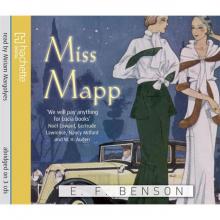 Miss Mapp
Miss Mapp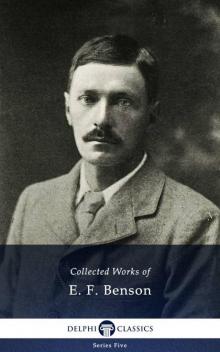 Works of E F Benson
Works of E F Benson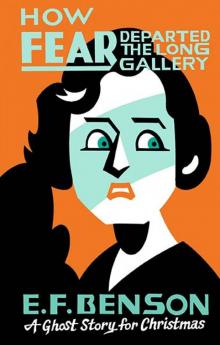 How Fear Departed the Long Gallery
How Fear Departed the Long Gallery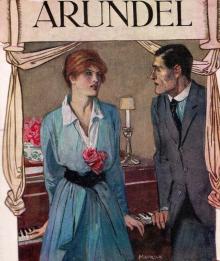 Dodo's Daughter: A Sequel to Dodo
Dodo's Daughter: A Sequel to Dodo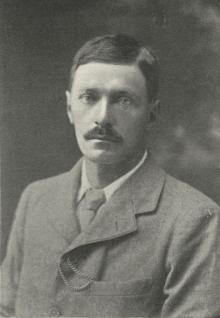 The House of Defence v. 1
The House of Defence v. 1 Queen Lucia
Queen Lucia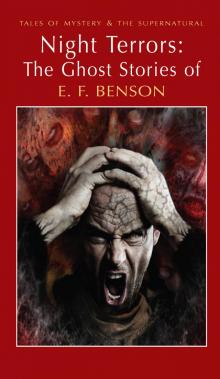 Night Terrors
Night Terrors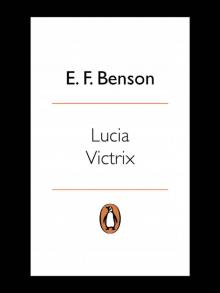 Lucia Victrix
Lucia Victrix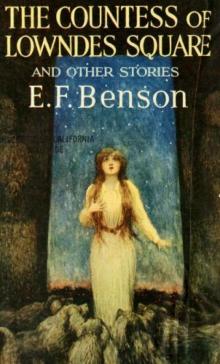 The Countess of Lowndes Square and Other Stories
The Countess of Lowndes Square and Other Stories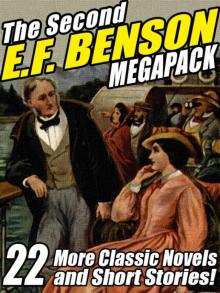 The Second E. F. Benson Megapack
The Second E. F. Benson Megapack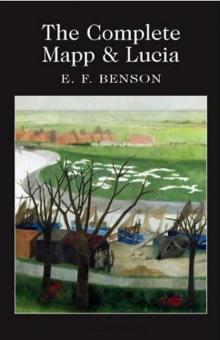 The Complete Mapp & Lucia
The Complete Mapp & Lucia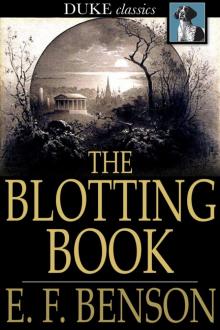 The Blotting Book
The Blotting Book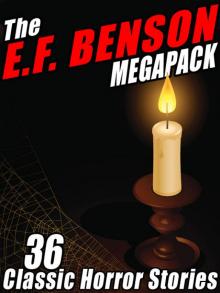 The E. F. Benson Megapack
The E. F. Benson Megapack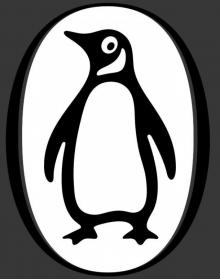 Lucia Rising
Lucia Rising Ghost Stories
Ghost Stories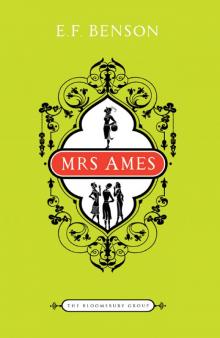 Mrs. Ames
Mrs. Ames E. F. Benson
E. F. Benson